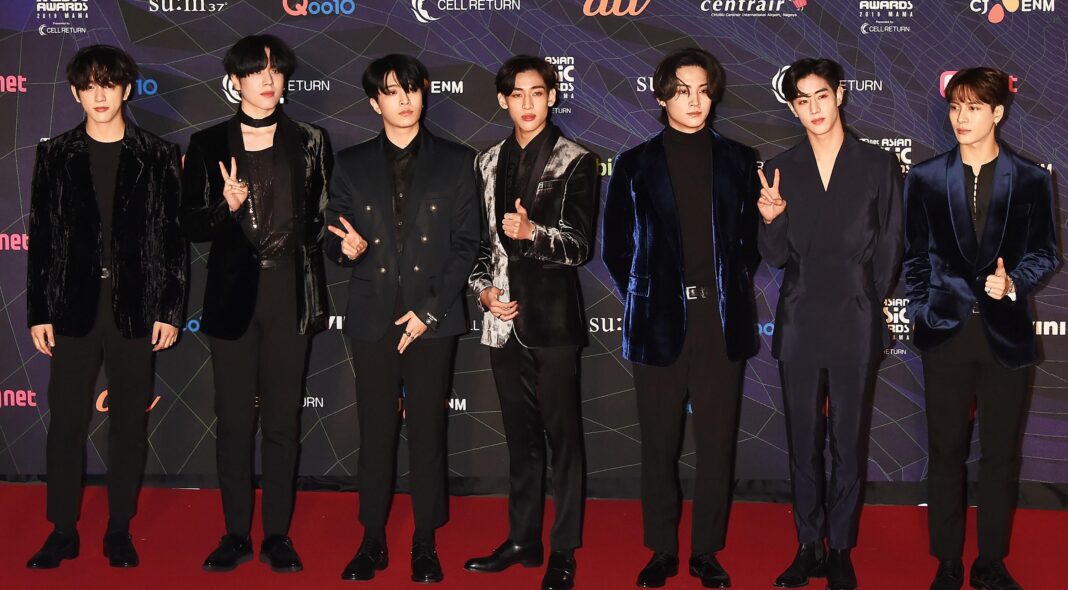It might seem odd for a fanbase to Tweet “CONGRATULATIONS GOT7” and “GOT7 FREEDOM” on hearing that their favourite group is splitting up. But that is exactly what happened this month after news broke that the South-Korean boyband GOT7 had chosen to not renew their contract with JYP – one of the “big three” in Korean entertainment.
Groups disbanding in K-pop is no rare thing but usually the decision is out of their control. Often it’s because the recording contract signed as teens isn’t renewed by their management company. When that happens, it’s almost certain the members will fade away, quickly getting replaced, in the fickle world of fandom, by the next batch of trainees.
In the case of GOT7, however, that process was flipped on its head, causing a burst of excitement around their exit. Could they survive on their own? Will they sign elsewhere? Have they finally escaped the clutches of an oppressive company?
As news trickled through online – quickly snowballing after it was revealed that youngest member Yugyeom had chosen not to renew his contract with the entertainment giant – and as members one by one unfollowed CEO JYP on social media, fans watched him loosen his grip on the group for the first time in seven years. Although the boys’ futures are up in the air, their decision to not renew their contract with JYP feels like a small victory for a group of idols who’ve had barely any control over their own careers since initially signing up as trainees.
“It’s the end of an era in many respects and with GOT7 being my first group and ultimately, my introduction to K-Pop, it’s such a huge moment for me as a fan”, says Robyn, a 22-year-old blogger who was introduced to the group in 2016 and has followed them closely ever since. “As a group, they’re incredibly talented. I feel that had they received more promotion from JYP, they could make a huge impact in music and beyond.”
Those frustrations were echoed by 23-year-old Emily, a fellow superfan, saying “I personally think this is something different from a regular group disbanding. JYPE is a very popular company, and GOT7 were a huge part of it, but JYP hasn’t shown off the right amount of promotion for GOT7 like he’s done for his other groups. This last comeback, they were only given about two weeks of promo, which isn’t long at all for most K-pop groups.”
Nadia, a 22-year-old student and another long-time K-pop stan, is particularly disheartened by the situation, saying, “I feel heartbroken. I wish there was a way they could all stay together and not be under that same company. Compared to other disbandments I do feel that this is different in the sense that they didn’t burn out and the company didn’t cancel them but that the members felt so restricted they couldn’t achieve all that they wanted to, not only for themselves but their fans as well.”
While it’s unclear why GOT7 are leaving JYPE, a statement given by the company claims both sides agreed not to renew the contract, and that JYP will sincerely cheer on the group in the future. We reached out to JYPE for further comment, but as yet, have not received a response.
For many K-pop fans, it’s well known that entertainment companies will take authority over their trainees’ (and subsequently idols’) diets, love lives and behaviours, in some cases creating personalities for their recruits, fake birthdays, and incorrect heights and weights, all creating an unattainable image that’s proven hard for idols themselves to uphold.
In 2018, Cube Entertainment booted soloist Hyuna and Pentagon’s E’Dawn from the label, as it was revealed the pair were in a relationship. At the time, the two were in the group Triple H with Hui, another Pentagon member, a successful venture for Cube that was abruptly cut as the news broke and Hyuna and E’Dawn were removed from the company.
“It seemed an extreme reaction on the company’s behalf, particularly when the news was widely celebrated by fans,” says Robyn. “I believe K-Pop stars should have the same rights as anyone else and this includes dating. It’s such a natural part of life and in my mind, it seems wrong for an entertainment company to dictate how someone should live their life.”
Hyuna experienced complications with Cube years prior, when the rest of her group 4Minute chose not to renew their contracts, in a situation not too different from GOT7’s.
Chloe, a 23-year-old writer who’s been a K-pop stan since way back in 2009, has seen many of her favourite groups disband, including 4Minute. “That was expected given Hyuna was the only member who was getting a spotlight outside of the group with her solo activities,” she says. “With something like that I feel like it’s not surprising when other members aren’t wanting to continue anymore, I understand having a most popular member but it’s down to bad management if you’re not even giving the other members a chance to shine.”
“It’s frustrating as a fan to see that the majority of the time, when a group disbands there’s often underlying issues rather than their contracts just being up,” she adds.
Although moments of transparency are few and far between for K-pop stans, each one feels like a triumph. Back in 2010, three members of TVXQ – one of the first majorly popular groups to emerge from SM Entertainment in 2003 – took their label to court, claiming their thirteen-year contract was too long, too restrictive, and that profits were unfairly distributed among members. The trio (also known as JYJ) won their case, marking a significant change in the industry, as contracts were then limited to seven years as a maximum.
Throughout their turbulent, albeit iconic, career, 2NE1 suffered their fair share of disputes with company boss, YG. A hiatus sparked by member Park Bom’s suspension, following a prescription drug-related scandal in 2014, left the other three girls to explore solo ventures. While they were still technically signed to the label, restrictions meant no new music was released, and after Minzy left in 2016, the group disbanded within a year. Throughout the hiatus, leader and rapper CL tried to crack the US, signing a deal with Hollywood management juggernaut Scooter Braun, and ended up being held back from releasing her solo material on two continents. Finally freed in 2019, CL released the ‘In The Name Of Love’ EP where each track is dated at the time of recording, later returning properly in 2020 with the same rebellious spirit that’d brought her to prominence over a decade ago.
When now-solo idol Wonho was evicted from his group Monsta X in 2019, for drug-related allegations that he was later cleared of, fans banded together to campaign for his return. While he never rejoined the group, he did successfully launch a solo career under a year later in a subsidiary of Starship Entertainment (Monsta X’s label), fans welcoming him with open arms. “Wonho’s departure from Monsta X seemed to shake the K-Pop industry and at the time it was such a prominent topic across the community,” says Robyn, who admits although she isn’t a huge fan of the group, heard about the controversy for months.
Still, not much gets between a K-pop group and their stans. Read or watch any interview with any group or idol and they’ll thank their fans at least once. Many of them mention that they do everything for their fans, that it’s their main motivation, and whether it’s true or all part of the concocted image, their respective fandoms give that energy right back. For most groups or idols, as long as there are fans, there’s hope.
As with the cases of CL, Wonho, Hyuna and Dawn, it’s the continued fan devotion that’s lifted those idols out of potential obscurity after walking away or being kicked out of huge companies.
Chloe says, “I feel like as long as the group is still making music I enjoy I’d want to support them, and depending how those changes or disbandment went, I would want to support them more, such as if they got out of a bad contract. The fact that Hyuna originally renewed her contract with Cube clearly meant she had intended to stay, and wanted to, but then she went to Psy’s label and it was like, yeah, you go girl!”
“When I become a fan it’s down to the fact that I love the artist’s music and through the years have gained a sense of comfort from it,” adds Robyn. “My favourite artists have always been there in my times of need and their music is the pick me up I’ve come to rely on, so why, as a fan, wouldn’t I return the same courtesy and support to the people who helped me?”
Nadia, who mentions she’s seen many of her favourite groups, including EXO, IKON, and The Boyz, lose members over the years, is similarly determined to stick by their sides. “Although it is sad, I still stan them because the love I have for the group and the members exceeds the severe dislike I have for their companies. In a way, I feel like it’s my obligation to continue to stan them out of my gratefulness that they’ve endured so much.”
So what does all of this mean for GOT7? Although many are speculating something was going on behind the scenes at JYP that motivated their decision to leave, being signed to a huge entertainment company has its cushioning. But so far, it’s looking good for the boys; they’ve won the rights to their group name and intellectual property, meaning as they finalise their divorce with JYP Entertainment, they’ll get custody of their albums, music videos, fanbase name and more.
On the same day that GOT7 announced their departure from JYP, they accepted a Golden Disc Award for Best Album, thanking no one other than their fans in their speech – an emotional parting gift for their supporters. Individually, they look to be exploring new avenues, with LA-born Mark Tuan returning to his hometown and starting a YouTube channel, Chinese member Jackson Wang continuing work on his solo projects back in China, and fast-rising actor Jinyoung looking towards a bright future in K-drama, but all are promising they’ll still be together.
“I think it’s a good thing that groups are more concerned with the group than the company, and would do what’s best for themselves as a unit rather than try and stay loyal to a company who probably isn’t all that loyal to you,” says Chloe of the departure.
Robyn adds, “I admire GOT7 for their authenticity and believe that this decision is a strong example of their friendship and loyalty to one another. The guys have always emphasised their motto ‘7 or never, 7 or nothing’ and this decision was a true example of it. I wholeheartedly trust their decision and feel so proud and excited to follow their journey wherever it may take them!”
Of course, pop groups splitting isn’t limited to the Korean ones. As recently as December, we saw Jesy Nelson walk away from Little Mix after almost a decade under Simon Cowell’s thumb, choosing her mental health over fame, a job she’d lost passion for, and the pressures and trolling that came along with it. Similarly, we’d seen Zayn Malik leave One Direction (arguably the biggest boy band in the world until K-pop took over) in 2015, when he realised his heart wasn’t in it anymore. K-pop idols getting the autonomy they deserve and being able to say enough is enough, putting faith in the people that made them that they’ll be able to continue along a different path, is a huge step for a notoriously oppressive industry that’s only set to dominate further.






